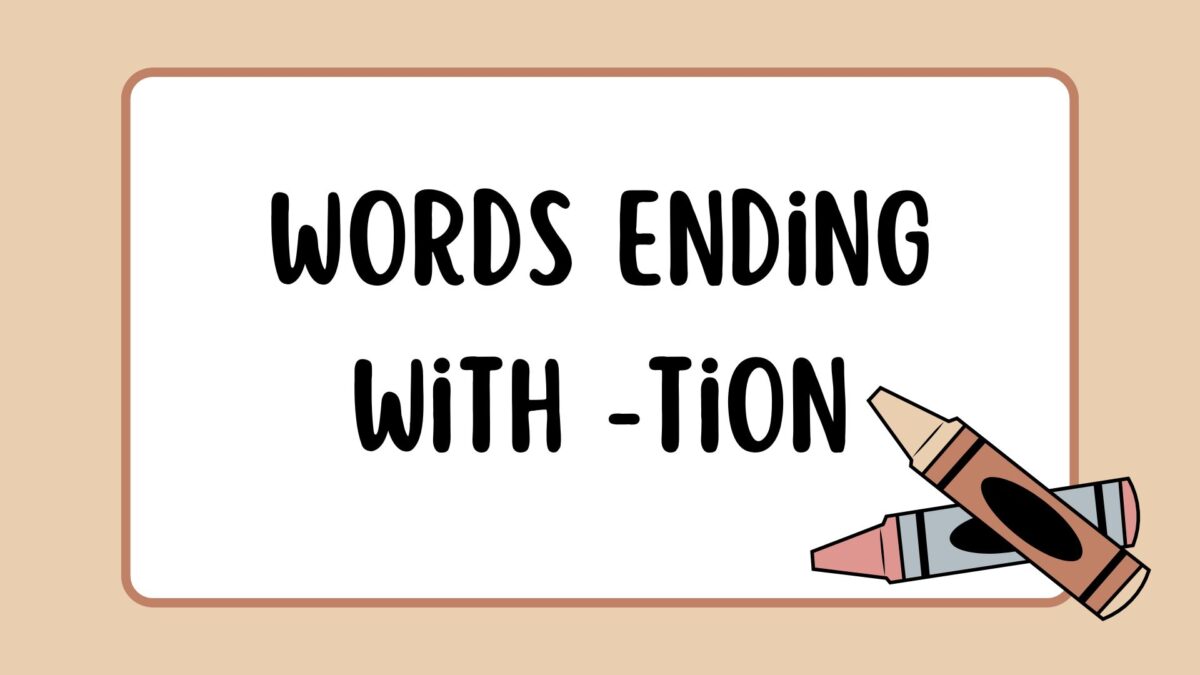150 Words Ending with tion with their Meanings
The tion suffix changes verbs into nouns, making language richer. This article lists 150 words ending with tion and their meanings to help you improve your vocabulary and communication skills.
Introduction to Words Ending in tion
Words that end in tion change verbs into nouns, making complex ideas easier to express. This suffix shows the action of a verb, like “creation” from “create.” It highlights how language can summarize thoughts well.
Also, -tion words have strong meanings that change based on context. For example, “celebration” implies happiness, while “frustration” suggests difficulty. This variety shows the emotional power of language and how word choice affects our views and feelings.
Importance of Words ending with tion in Language
The suffix “-tion” turns verbs into nouns, helping us express and understand complex ideas better. Words like “creation” and “communication” represent actions and their results, making discussions more detailed.
Words ending in tion are common in many fields, acting as shortcuts for complicated theories and processes. For example, “evaluation” means not just to assess but also to analyze carefully, highlighting the importance of precise language.
List of 150 tion Words
Here’s a list of 150 words ending with tion, along with their meanings. These are mostly nouns formed from verbs, describing actions, processes, or states.
1. Abduction – the act of taking someone away illegally.
2. Abbreviation – a shortened form of a word or phrase.
3. Abstention – the act of choosing not to vote.
4. Absorption – the process of taking in a substance or information.
5. Acceleration – an increase in speed.
6. Acclamation – loud and enthusiastic approval.
7. Adaptation – the process of changing to fit a new environment.
8. Adoration – deep love or respect.
9. Alteration – the act of making changes.
10. Application – a formal request or the use of something.
11. Appreciation – recognition of value or enjoyment.
12. Aspiration – a hope or ambition of achieving something.
13. Attraction – the action or power of drawing interest.
14. Attention – the act of focusing one’s mind.
15. Attenuation – the reduction of force or value.
16. Automation – the use of machines instead of people.
17. Aversion – a strong dislike.
18. Calculation – the process of using math or logic.
19. Cancellation – the act of calling something off.
20. Celebration – the act of marking a special event.
21. Cessation – the process of ending or stopping something.
22. Circulation – movement in a circular route or system.
23. Classification – arranging into categories.
24. Collaboration – working together with others.
25. Collection – the act of gathering things.
26. Collision – an instance of two things hitting each other.
27. Combustion – the process of burning.
28. Commission – a group of people given a task or a payment for services.
29. Complication – a problem or difficulty.
30. Computation – the process of calculation.
31. Concentration – focused attention or the density of a substance.
32. Condensation – water vapor becoming liquid or the act of shortening text.
33. Confederation – an alliance of states or groups.
34. Confirmation – verification or approval.
35. Conflagration – a large, destructive fire.
36. Confusion – lack of clarity or understanding.
37. Conjugation – the combination of verbs or genes.
38. Connection – a link or relationship between things.
39. Conservation – the protection of resources or heritage.
40. Consideration – careful thought or regard for others.
41. Construction – the act of building.
42. Contemplation – deep reflective thought.
43. Continuation – the act of carrying on.
44. Contraction – the process of becoming smaller.
45. Contribution – something given to help.
46. Correction – the act of fixing a mistake.
47. Corruption – dishonesty or illegal behavior.
48. Creation – the act of bringing something into existence.
49. Cremation – burning a dead body.
50. Criticism – judgment or evaluation.
51. Decoration – adding something to improve appearance.
52. Deduction – reasoning from general to specific.
53. Deflation – decrease in prices or air removal.
54. Dehydration – loss of water.
55. Delegation – assigning tasks to others.
56. Deliberation – careful consideration.
57. Demonstration – a show of proof or protest.
58. Denunciation – public condemnation.
59. Depiction – a representation in words or pictures.
60. Deposition – the removal from power or sediment laying down.
61. Depreciation – decrease in value.
62. Desperation – a state of hopelessness.
63. Destruction – the act of destroying.
64. Determination – firmness of purpose.
65. Detonation – an explosion.
66. Devastation – severe destruction or damage.
67. Deviation – departure from the norm.
68. Dictation – spoken words to be written down.
69. Diminution – reduction in size or importance.
70. Direction – guidance or course.
71. Disconnection – separation of links.
72. Discrimination – unjust treatment based on difference.
73. Disruption – interruption of a process.
74. Dissolution – breaking apart or ending.
75. Distinction – a difference or honor.
76. Distortion – misrepresentation or warping.
77. Distribution – giving out or spreading.
78. Domination – control over others.
79. Donation – something given voluntarily.
80. Duration – the length of time something lasts.
81. Education – the process of learning.
82. Elimination – the act of removing.
83. Emigration – leaving one’s country to live elsewhere.
84. Emotion – a strong feeling.
85. Erosion – wearing away of surface material.
86. Evacuation – removal of people from danger.
87. Evaluation – judgment or assessment.
88. Evolution – gradual development over time.
89. Exaggeration – overstating the truth.
90. Examination – inspection or test.
91. Exclamation – a loud or emotional statement.
92. Exhaustion – extreme tiredness.
93. Exhibition – a public display.
94. Exhortation – urgent advice.
95. Expectation – belief something will happen.
96. Explanation – a statement that makes something clear.
97. Explosion – a violent burst.
98. Extraction – removal of something.
99. Fabrication – making up or manufacturing something.
100. Fascination – intense interest.
101. Federation – a group of states with a central government.
102. Fertilization – process of making fertile (biological or agricultural).
103. Fluctuation – irregular rising and falling.
104. Formation – the act of forming something.
105. Frustration – feeling of annoyance due to obstacles.
106. Generation – all people born around the same time, or the production of something.
107. Graduation – completion of a course of study.
108. Gratification – pleasure or satisfaction.
109. Hesitation – pausing before doing something.
110. Humiliation – loss of dignity or pride.
111. Identification – recognizing or naming something.
112. Imagination – the ability to create ideas in the mind.
113. Imitation – copying behavior or appearance.
114. Immigration – coming into a country to live.
115. Implementation – putting a plan into effect.
116. Impression – a mark or effect.
117. Improvisation – doing something without preparation.
118. Incarceration – imprisonment.
119. Inclination – a tendency or preference.
120. Incrimination – making someone seem guilty.
121. Indignation – anger at injustice.
122. Induction – process of introducing or initiating.
123. Infection – the spread of disease.
124. Inflation – rise in prices or expansion.
125. Information – knowledge or facts.
126. Innovation – a new idea or method.
127. Inspiration – motivation or creative influence.
128. Installation – setting up something for use.
129. Instruction – teaching or direction.
130. Intention – a purpose or plan.
131. Interaction – reciprocal action or influence.
132. Intervention – interference to alter a result.
133. Interruption – a break in continuity.
134. Introduction – beginning or presentation.
135. Investigation – a detailed inquiry.
136. Invitation – a request to attend.
137. Irritation – annoyance or inflammation.
138. Justification – reason or explanation for something.
139. Legislation – law-making process.
140. Limitation – restriction or boundary.
141. Manipulation – skillful handling or control.
142. Migration – movement from one place to another.
143. Modification – change or alteration.
144. Multiplication – increase in number or math operation.
145. Narration – storytelling or description.
146. Negotiation – discussion to reach agreement.
147. Notification – formal announcement.
148. Observation – watching carefully.
149. Operation – a procedure or action.
150. Organization – structured group or arrangement.
Usage Examples for Clarity
Here are 50 example sentences using words ending with tion for clarity.
1. The abduction of the child was reported immediately to the police.
2. Please include your degree certification with the job application.
3. Her sudden resignation surprised everyone in the office.
4. The construction of the new bridge will take two years.
5. He received a standing ovation after his presentation.
6. Regular hydration is essential during hot weather.
7. The teacher gave a detailed explanation of the math problem.
8. Their donation helped fund the school library.
9. A loud explosion was heard from the factory.
10. The conversation was interrupted by a phone call.
11. The investigation revealed new evidence.
12. Her facial expression showed disappointment.
13. He showed great determination in finishing the race.
14. Our destination is still three hours away.
15. The education system needs reform.
16. The organization provides food to the homeless.
17. There was a moment of hesitation before she answered.
18. The celebration lasted all night.
19. A brief description was printed on the box.
20. The connection between the two events is unclear.
21. His reaction was calm and measured.
22. We made a reservation at the restaurant for 7 PM.
23. The reduction in staff will affect productivity.
24. Her voice filled with emotion during the speech.
25. Their migration was due to climate changes.
26. The transformation was incredible to witness.
27. The information you provided is very helpful.
28. I need your permission to enter the room.
29. The completion of the project was ahead of schedule.
30. He faced accusation of stealing company funds.
31. The division of tasks improved team efficiency.
32. A lack of communication can lead to misunderstandings.
33. The application was rejected due to missing documents.
34. They made a recommendation to improve the policy.
35. The direction he gave was confusing.
36. Her imagination knows no bounds.
37. Pollution is a serious issue in urban areas.
38. The film received positive criticism from reviewers.
39. The installation of the new software went smoothly.
40. His motivation to learn impressed the teacher.
41. After the interruption, she continued her speech.
42. His participation in class improved his grades.
43. Their cooperation made the event successful.
44. The team discussed the distribution of resources.
45. The decision was made after long deliberation.
46. She expressed her appreciation for the support.
47. The company offered him a promotion.
48. The vibration from the machinery could be felt across the room.
49. Rotation of crops is important for soil health.
50. The expiration date is printed on the label.
Tips for Learning tion Vocabulary
To learn tion words, use context instead of memorizing. Try using words like “innovation” or “collaboration” in conversations. This approach helps you understand and communicate better.
Creating pictures in your mind can also help. For example, think of “celebration” as a fun party. These images make it easier to remember the words. You can also make a word map that connects tion words with their synonyms and antonyms. This will improve your understanding and expand your vocabulary. Using these strategies makes learning vocabulary fun instead of boring.
Time Words in English–A Simple Guideline
Discover 15 Confusing Words That Challenge Your Language Skills





